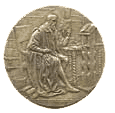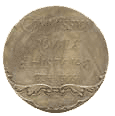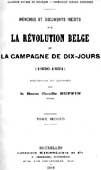Chronological milestones
17701827Under Charles of Lorraine, Governor General of the Austrian Netherlands, the plenipotentiary, Count Charles de Cobenzl, a supporter of the Enlightenment, fostered the idea of encouraging the research and publication of the country's principal chronicles.
In 1759, Abbot Corneille-François de Nelis, librarian at Louvain University and future Bishop of Antwerp, had the idea of publishing a collection of works by former Belgian historians, the "Belgicarum rerum prodromus sive de historia Belgica ejusque scriptoribus praecipuis commentatio".
After the minister's death in 1770, his ideas were taken up by the Imperial and Royal Academy of Brussels. At the instigation of Georges-Joseph Gérard, its Secretary and subsequent Director, Monumenta historiae Belgicae came to fruition. The results were nevertheless limited.
The creation, according to Nelis's ideas, of a special Commission with the task of publishing previously unpublished chronicles which were of interest to national history. The initiative covered the southern part of the Kingdom of the Netherlands.1834
183622nd July
Following a proposal made by Charles Rogier, Minister of the Interior, Leopold I, the Belgian king, signed the royal decree which founded a "Commission whose task is to research and update previously unpublished Belgian chronicles". The abbreviated title, "Royal Historical Commission", was the name which was to prevail afterwards.
The Institution was free to act in scientific matters but its members were to be appointed by the king.
The Presidency was conferred on Baron Etienne-Constantin de Gerlache who was appointed Head of the National Congress in February 1831.
Frédéric de Reiffenberg, Professor at the State University of Louvain and afterwards at Liège, and who was to become Head Curator at the Royal Library, took up office as Secretary. Louis-Prosper Gachard, the National Head Archivist, took up office as Treasurer. The other members included Mgr Pierre de Ram, Rector of the Catholic University of Louvain who was appointed a few months later in November; Louis Dewez, Permanent Secretary to the Royal Academy of Sciences, Arts and Fine Arts of Belgium; Léopold-Auguste Warnkoenig, Professor at the State University of Ghent; and Jan-Frans Willems, Registrar at Ekloo and a specialist in historical and literary Flemish manuscripts.
The Commission was established on 4th August.4th and 6th August
The publishing regulations were decreed<
18372nd March
The first of a long series of publications were submitted to the King:
the Chronique en vers de Jean Van Heelu ou relation de la bataille de Woeringen. Rymkronyk van Jan Van Heelu betreffende den slag van Woeringen, edited by the good offices of J.-F. Willems, a study to be found in the series in-4°.
IInitially, the minutes of meetings appeared in the columns of the Moniteur belge. During that year, it was decided to issue a separate publication edited by the Commission itself: Compte rendu des séances de la Commission royale d'Histoire ou recueil de ses Bulletins. Volume I, (meetings held from 1834 to 1837), appeared in the second edition in 1844. In 1904, the publication was given the title Bulletin de la Commission royale d'Histoire.
From Volume C (1936) onwards, the publication had a bilingual title: Bulletin de la Commission royale d'Histoire - Handelingen van de Koninklijke Commissie voor Geschiedenis
18458th December
By royal decree, the decision was taken to endow Belgium with a chronological Table of printed charters in respect to its history. A ministerial decree issued on 16th November 1838 laid down the regulations to be followed.
185429th March/h3>
A ministerial decree established the rules of the Royal Historical Commission.
1st December
The Royal Historical Commission became affiliated with the Académie royale de Belgique, where it thereafter held its meetings.
1859Whereas the Commission had been limited mainly to the medieval period until this time, Gachard published the first volume covering the Modern Period in the series in-8°.
The Commission celebrates its first 25 years of existence. A commemorative medal was produced for the occasion.1869
Deputy members, who were unlimited in number, were nominated to replace members in office.1870
At about this time, Commission staff were largely renewed. Gachard was to outlive his colleagues who covered the period back to 1834. Among the new staff appointed, the majority were State or local archivists. Their presence helped even more to redirect the Commission's aims towards large-scale studies of ancient documents.1896
1898The Instructions pour la publication des textes historiques was developed on the initiative of Henri Pirenne.
Its aim was to give publications a critical approach and to standardise presentation.
1909The Commission developed an extensive work programme which led to a more advanced publishing policy.
19229th November


The commemoration took place, in the presence of the King Leopold II, of the 75th anniversary of the Commission.
Nomination of an unlimited number of deputy members who were to replace members in office.

With the publication of the two-volume Mémoires et documents sur la révolution belge et la Campagne des Dix jours, edited by Baron Buffin, the Commission went beyond the chronological boundaries of the Old Regime for the first time.
Eugène Hubert, Minister for the Sciences and Arts and Member of the Commission, authorised the Commission to accept applications for membership which were to be submitted to him. This procedure became official in the statutes laid down in 1954.1934
28th November

The Royal Historical Commission celebrated its centenary in the presence of the King and Queen. On this formal occasion, Henri Pirenne, the Treasurer, gave an account of the institution's historical background.
On the same occasion, a jubilee book was published, La Commission royale d'Histoire, 1845-1934. Livre jubilaire composé à l'occasion du centième anniversaire de sa fondation par les membres de la Commission, Brussels, Palais des Académies, 1934.
1938
16th March
founding by royal decree of the Koninklijke Vlaamsche Academie voor Wetenschappen, Letteren en Schoone Kunsten van België.
The Royal Historical Commission was thereafter placed under the patronage of the two academies.
1950
Minutes of meetings are drawn up in the two national languages.
1954<
196710th February
By royal decree, a new statute within the Commission was enacted whereby new members are co-opted. Their appointment is subject to royal approval. Deputy members are elected by members in office, subject to ministerial approval.
Founding of an International Committee with the aim of developing a new index of historical sources relating to the Middle Ages (Repertorium fontium Medii Aevi), designed to replace Potthast's list.
The Royal Historical Commission ensured Belgian representation on this committee. Up until his death in 1979, the Secretary, Fernand Vercauteren, made a significant contribution to the Committee's work.
Although there were no vacant posts at the time, the Commission decided to appoint two philologists, a Romanist and Germanist, outside the quorum.1971-1972
1972
The policy of nominating members aimed to have an equal number of appointees from both national languages, a target which has now almost been reached.
197623rd September
Creation of the Vice-President's post, subject to changes in the royal decree of 1954 which did not take the post into account. The position was to be filled by a member who spoke the national language not represented by the President.
19791st April
A royal decree established a status of equality between the two language communities. Each community was to have eight members and the post of deputy member was to be abolished. The autonomy of the Commission was protected by both language communities of the Royal Academy of Belgium. Royal decrees of the 3rd and 8th March 1983 introduced additional provisions.
Creation of the post of Assistant Secretary-Treasurer using the national language not represented by the Secretary-Treasurer. Together with the President and Vice-President, these members formed the Executive Committee of the Commission. Members are elected and posts are of fixed duration. The Executive Committee is assisted by the Administrative Secretary.1982
The Commission adopted a new Regulation regarding internal organisation.1994
199626th December
By amendment to its Internal Regulation, the Commission introduced the status of honorary member.
19977th December
The Commission took the initiative of participating in the des Monumenta Paleographica Medii Aevi, project, placed under the auspices of the Académie des Inscriptions et Belles-Lettres in Paris, and under the patronage of the International Academic Union and Council of Europe. Within this framework, the Series Belgica, created under the joint patronage of the two national language communities of the Royal Academy of Belgium.
2006The "New Wauters" was made available to the public in the form of a CD ROM, together with a user's manual in three languages (French, Dutch and English): Thesaurus diplomaticus .
A convention was established with the Institute for Universal History at the Academy of Sciences in Moscow, with a view to publishing a guide of archive collections kept in Moscow and which are of importance to the history of Belgium.

Constitution of a Porta Historica European network upon the initiative of the “Instituut voor Nederlandse Geschiedenis” (ING). The Commission has been invited to join the group composed of the five founding members.2009
The Commission is celebrating its 175th anniversary. For this occasion, it has founded the Henri Pirenne Prize. Two international symposiums are also being organised. Linked to the Porta Historica members meeting in Brussels in April, the theme of the first symposium is “Digital edition of sources in Europe: achievements, (juridical and technical) problems and prospects”. The second one, to be held in December, relates to the “Chancelleries princières et scriptoria, du Xe au XIVe siècle”.
The Bulletin 2009 is a jubilee volume, including the history of the past twenty-five years, biographical notices and contributions from members and honorary members.
